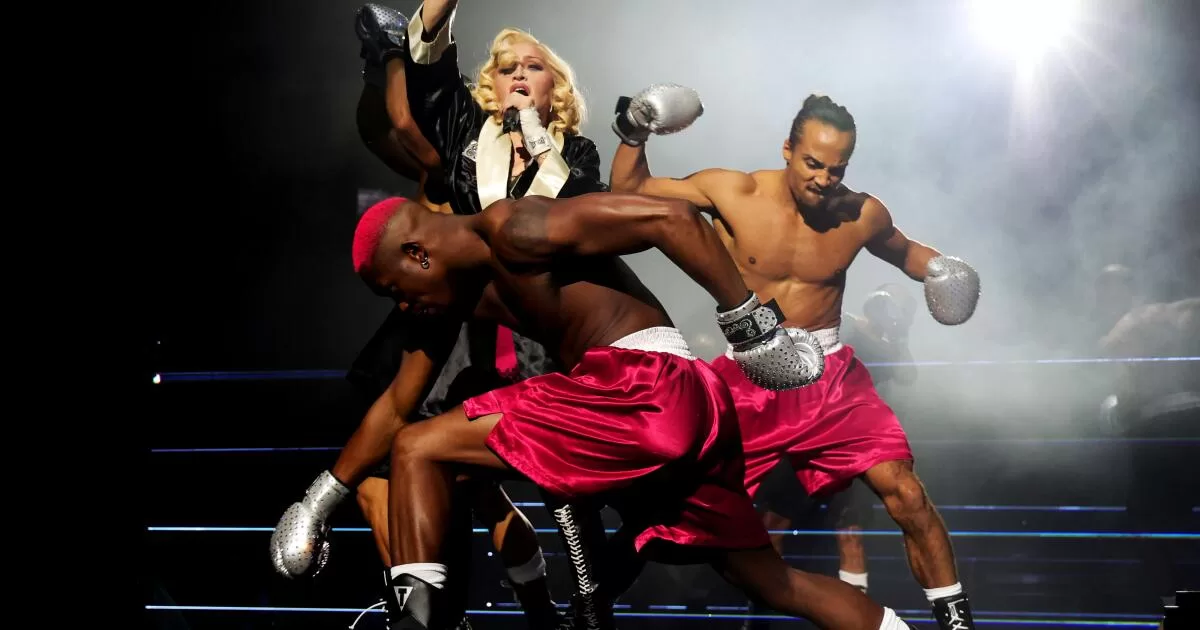Standing onstage before an adoring audience of thousands Monday night at the Kia Forum in Inglewood, the pop icon flashed back 40-something years to the evening in the early 1980s when she debuted her song “Burning Up” for a smaller and more hostile crowd at New York’s legendary CBGB.
“People were screaming at me, ‘Show us your tits!’” she recalled. “And at the time, I didn’t have any tits because I wasn’t eating.” She laughed. “Being broke and homeless and friendless and jobless and foodless and anorexic — it was not a vibe.”
Monday’s concert was the first of five at the Forum on Madonna’s Celebration Tour — a career-spanning road show meant to “tell you the story of my life,” as she put it not long into the two-hour-and-15-minute performance. In the age of Taylor Swift’s world-conquering Eras Tour, that retrospective framing can seem like the obvious choice for a musician with a catalog as deep as Madonna’s.
Yet the 65-year-old singer has always resisted a play-the-hits approach in favor of showcasing her latest work (as in the intimate theater dates she did in 2019 and 2020 behind her most recent studio album, “Madame X”). So it made sense that she felt a bit of explanation was in order.
“I hope you can handle it,” she told her fans, “’cause just imagine: I had to live it.”
Only a churl would deny Madonna the right to a victory lap, so monumental is her standing in pop history — not just as a maker of indelible songs and genre-defining videos but also as a cultural pathbreaker whose commitment to feminist and queer ideals continues to open lanes in the mainstream even now.
“You can all thank me for allowing you to have the courage to come out,” she said Monday, which is certainly one way to describe the work of ally-ship that’s long distinguished her career.
For a tour called Celebration, though, this show — with more than two dozen of Madonna’s songs divided into seven acts — was curiously short on joy; again and again, she brought the crowd’s attention to the indignities as opposed to the victories of her ascent, as in the CBGB anecdote or in a little skit before “Holiday” in which she acted out being turned away by a doorman at the Paradise Garage.
Late in the night, she spoke for a few minutes about the “near-death experience” she suffered last summer that forced her to postpone the tour’s launch and left her nearly unable to walk from her house to her backyard.
“I know that sounds insane, but it was difficult then,” she said. “I didn’t know when I could get up again and when I could be myself again and when I would have my energy back.”
That she was telling us this from a stage — and with her trusted doctor in the house, she pointed out — was, of course, its own triumph. Yet Madonna’s performance rarely tapped into the sense of abandon you’d hope would accompany such a win. The result was easy to admire but not always easy to love.
Overly moody arrangements of once-ebullient hits like “Hung Up,” “Ray of Light” and “Like a Prayer” didn’t help; nor did the baffling decision to forgo all-timers such as “Music,” “Borderline,” “Secret” and “Lucky Star” to make room for the likes of Madonna’s forgettable Bond theme, “Die Another Day.” “Like a Virgin” was part of the show but only as a prerecorded mash-up with Michael Jackson’s “Billie Jean” that played as digital silhouettes of the two superstars were projected onto a screen. (As costume-change distractions went, it beat the vaguely pagan fire ritual undertaken by several of her dancers.)
Could you say that the life story Madonna promised to tell cohered Monday with any discernible logic? Not in a show that inexplicably jammed together the pugnacious “Human Nature” and the yearning “Crazy for You.” That’s not a problem, per se: A pop concert is a theater of personality and craft, not one of plot or character development. But a narrative this messy needed more razzle-dazzle.
Madonna being Madonna, she couldn’t help but dole out some during a few moments at the Forum. “Vogue” was a high point that had her dancers (including one of the singer’s daughters) competing in a rowdy ballroom tableau judged by Madonna and comedian Eric André. “Live to Tell” was a moving tribute to people who’d died of AIDS complications; “Take a Bow” was another gorgeous ballad, with Madonna’s strongest vocal of the night.
And then there was her surprising acoustic rendition of “Express Yourself,” for which she tweaked the song’s familiar intro — “Come on girls, do you believe in love?” — to include “boys,” “theys” and “thems.” On record, “Express Yourself” is a battering ram of industrial-funk encouragement; it exhorts the listener to create his or her own destiny. Here, as Madonna sang and strummed a guitar, the song seemed to acknowledge the cost of that process while urging us on all the same.
